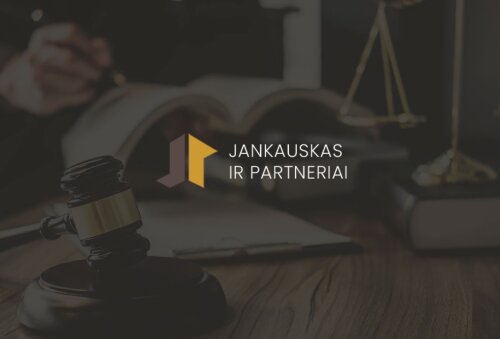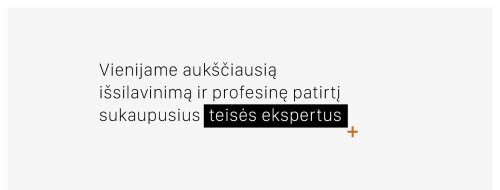Best White Collar Crime Lawyers in Kaunas
Share your needs with us, get contacted by law firms.
Free. Takes 2 min.
List of the best lawyers in Kaunas, Republic of Lithuania
About White Collar Crime Law in Kaunas, Republic of Lithuania
White collar crime in Kaunas, Republic of Lithuania, encompasses a range of nonviolent, financially motivated offenses usually committed by professionals, businesspeople, or public officials. These crimes typically involve fraud, corruption, embezzlement, money laundering, tax evasion, and similar illicit activities that breach trust or exploit official positions for personal gain. Lithuanian law addresses white collar crimes with specific legislation aimed at maintaining financial integrity, protecting businesses, and ensuring public confidence in both the government and private sectors. Courts in Kaunas rigorously enforce these laws to deter economic offenses and preserve the rule of law.
Why You May Need a Lawyer
Facing white collar crime allegations in Kaunas can be an intimidating and complex process. Here are some common situations where legal help is essential:
- If you are under investigation by law enforcement or state financial authorities for activities such as fraud, bribery, or embezzlement.
- If your business or employer is accused of corporate wrongdoing impacting shareholders or the public.
- If you have been summoned for questioning as a suspect, witness, or person of interest in a financial crime case.
- If assets have been frozen, seized, or subjected to pre-trial measures related to criminal proceedings.
- If you need to negotiate settlements, plea bargains, or cooperate with authorities without self-incrimination.
- If your legal rights have been infringed by investigative authorities or you require defense during court proceedings.
A lawyer’s expertise can help you navigate Lithuania’s detailed regulatory environment, avoid common pitfalls, and ensure you receive fair treatment throughout the legal process.
Local Laws Overview
Lithuania’s approach to white collar crime is primarily based on its Criminal Code, which provides definitions and penalties for various economic crimes. Significant local provisions relevant in Kaunas include:
- Fraud (Sukčiavimas): Involves deception for financial gain, such as falsifying documents or misrepresenting facts.
- Embezzlement (Lėšų pasisavinimas): Misappropriation of funds by individuals entrusted with their management.
- Bribery and Corruption (Kyšininkavimas ir korupcija): Prohibited under Lithuanian law for both public officials and private sector employees.
- Tax Evasion (Mokesčių vengimas): Deliberate underreporting or concealment of income or assets to evade tax obligations.
- Money Laundering (Pinigų plovimas): Concealing or disguising the origins of illegally obtained funds.
Investigations may involve the Financial Crime Investigation Service (FNTT), the Kaunas District Prosecutor’s Office, and courts. Penalties range from fines to imprisonment and asset forfeiture, depending on the severity and scale of the offense.
Frequently Asked Questions
What is considered white collar crime in Kaunas?
White collar crime includes nonviolent offenses like fraud, embezzlement, bribery, corruption, money laundering, and tax evasion typically connected to business or professional roles.
Who investigates white collar crimes in Kaunas?
Institutions such as the Financial Crime Investigation Service (FNTT), police, and the Prosecutor’s Office are responsible for investigating such crimes locally.
What are the penalties for white collar crimes in Lithuania?
Penalties vary based on the offense's nature and severity and may include fines, confiscation of assets, and imprisonment.
Can I be prosecuted for a white collar crime committed abroad?
Lithuania can prosecute certain crimes committed abroad if they affect Lithuanian citizens or businesses or violate international agreements.
What should I do if I am accused of a financial crime?
Seek legal counsel immediately. Do not give statements to authorities without a lawyer present, and preserve all relevant documentation.
Can a lawyer help avoid criminal charges in these cases?
An experienced lawyer can often negotiate with authorities, ensure due process is followed, and potentially help avoid formal charges or reduce their severity.
Is it possible for a company to be held liable for white collar crime?
Yes, companies can face administrative or criminal liability for actions committed by their employees if the corporation benefits from or fails to prevent the offense.
How does asset seizure work in white collar crime cases?
Prosecutors can request court orders to freeze or seize assets believed to be connected to criminal activities to prevent their dissipation.
Are whistleblowers protected in Lithuania?
Lithuanian law provides certain protections for individuals reporting corruption or other forms of white collar crime, especially in the public sector.
How long do white collar crime investigations usually take?
Investigation duration varies based on case complexity, but these cases can often last several months or even years due to detailed analysis and evidence gathering.
Additional Resources
If you need help or more information, consider contacting the following organizations:
- Financial Crime Investigation Service (FNTT) – Responsible for investigating and preventing financial crimes.
- Kaunas District Prosecutor’s Office – Handles criminal prosecutions within Kaunas.
- State Tax Inspectorate – Investigates tax-related offenses and assists with compliance matters.
- Special Investigation Service (STT) – Focuses on corruption and bribery investigations.
- Bar Association of Lithuania – Provides listings of licensed lawyers in Kaunas specializing in criminal defense.
Next Steps
If you feel you are involved in or affected by a white collar crime case in Kaunas, Republic of Lithuania:
- Contact a qualified lawyer with experience in white collar crime defense.
- Gather and organize all relevant documents and communication related to the case.
- Do not discuss your case with anyone except your attorney to protect your rights.
- Comply with requests from authorities but always seek legal advice before providing statements or evidence.
- Monitor official communications and attend all required interviews or court dates.
Seeking legal advice as soon as possible is the best way to ensure your rights are protected and that you have the best odds for a favorable outcome.
Lawzana helps you find the best lawyers and law firms in Kaunas through a curated and pre-screened list of qualified legal professionals. Our platform offers rankings and detailed profiles of attorneys and law firms, allowing you to compare based on practice areas, including White Collar Crime, experience, and client feedback.
Each profile includes a description of the firm's areas of practice, client reviews, team members and partners, year of establishment, spoken languages, office locations, contact information, social media presence, and any published articles or resources. Most firms on our platform speak English and are experienced in both local and international legal matters.
Get a quote from top-rated law firms in Kaunas, Republic of Lithuania — quickly, securely, and without unnecessary hassle.
Disclaimer:
The information provided on this page is for general informational purposes only and does not constitute legal advice. While we strive to ensure the accuracy and relevance of the content, legal information may change over time, and interpretations of the law can vary. You should always consult with a qualified legal professional for advice specific to your situation.
We disclaim all liability for actions taken or not taken based on the content of this page. If you believe any information is incorrect or outdated, please contact us, and we will review and update it where appropriate.















